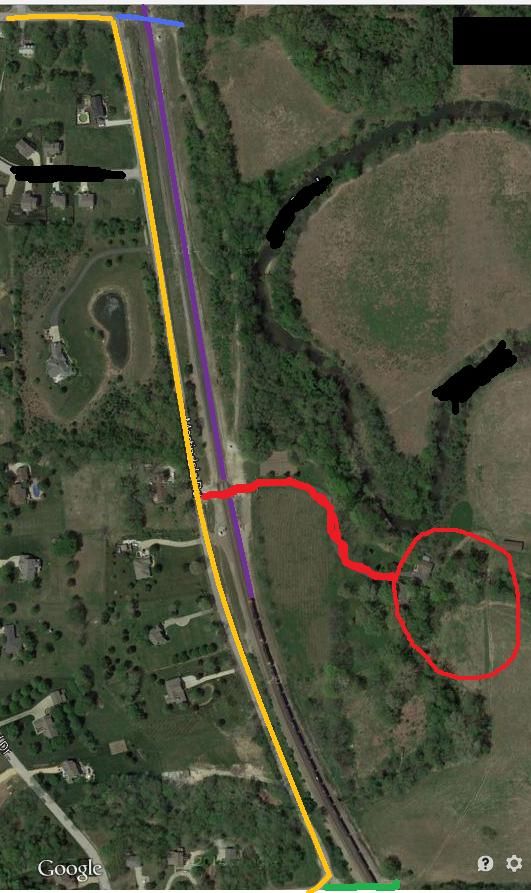Yellow Line: The main road, runs parallel with the train tracks. On the North side there the road "turns" and heads West. That area is treated as a "T" intersection, there are actual stop signs on the corners. And I've known of people to get a ticket here not treating it as such.
Blue Line: The cross-road. Heading East towards the tracks is impossible to due to a barrier there of large cement blocks, and a gate with private/railroad property warnings. Used to be a large "ROAD CLOSED" sign here. There's a standard crossbuck with signal-bells there but no lowering gate. The road mostly ends at the tracks as there's no grading or anything like that to allow a vehicle to get across the tracks. (There once was.) The crossing signals are on both sides of tracks, however.
Once over the tracks the paved road turns into a gravely road and at about the tree-line turns into a muddy "path." Continuing on you'd run into the creek and go further across the creek you'd find yourself on the walking path in the nearby park.
Purple Line: The train tracks, a double set.
Red Line: The driveway. Largely paved but about as much as a driveway normally is, on the West side of the tracks mostly gravel there. No signal, bell or gate here just the crossbuck. It's a pretty large property, somewhere around 30 acres.
Green Line: The third "intersection." At the crossing there's nothing there. No crossbuck, no signal, nothing. The road literally ends at the tracks. There is a gate and a standard stop sign with a second sign on it with the crossbuck on it and giving some lip service about the tracks. On the gate there's warnings about it being railroad property. The "road" is a gravel one. On the otherside of the tracks the road pretty much just turns into a worn down trail in the grass/yard.
So, yes, I can see the argument that the warning horns are not strictly needed here other than for whenever the driveway is in use. At the same time, is still just makes me laugh when people buy a property near an active set of railroad tracks and then get upset when the trains are too loud.
Reminds me of another incident a few years ago where a new community was fighting to get a nearby executive airport closed because the noise of incoming/departing light aircraft was too noisy. Which, again, struck me as funny given that these people bought property near an airport. Air traffic was never closed or restricted there. (Though I believe as much as possible they try and to route air traffic to/from the side of the runway that wouldn't have air traffic going over the housing development.)
Sorry, it makes me laugh when people have "problems" like this. They buy a $200K to $300K home near railroad tracks or an airport and then they expect everyone else to adapt their lives to suit THEM. The railroad industry needs to change to suit them. An airport needs to close to suit them, even though both were their first.
Strikes me as entitlement. Why not just deal with it? Would living near train tracks be annoying? I suspect so but then don't buy your home near them. Why potentially put lives at risk? Yeah these crossings are largely meaningless but at least one of them is an active driveway and the possibility always exists there could be an inattentive driver going across this driveway (either a visitor to the home, someone lost and turning around, or someone living there just being absent minded) and a warning *may* save a life.
I just find it funny. There's a lot of problems in the world I think the people in this community should be tackling. There's a lot of problems in the community that probably need to be tackled. But, no, trains are kinda-noisy so let's take care of that! Who cares that the local school-district needs to build new schools because they're starting to get crowded and are struggling to pass a bond or that some park improvements are needed. These people are sometimes getting woken up in the middle of the night and then having to roll over and then go right back to sleep!


 Just how long is the driveway, anyway? Short, like on a city street, or a long one like on an estate? Is it paved, or gravel? And what road does it lead out to? I'm probably misunderstanding this, but your description makes it sound like the driveway doesn't lead anywhere but to the train track.
Just how long is the driveway, anyway? Short, like on a city street, or a long one like on an estate? Is it paved, or gravel? And what road does it lead out to? I'm probably misunderstanding this, but your description makes it sound like the driveway doesn't lead anywhere but to the train track.

